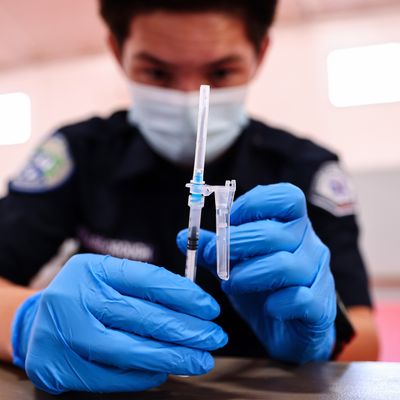
The extra lines on the vaccination cards of tens of millions of Americans who received the two-dose Pfizer vaccine may not remain empty forever. On Thursday, the pharmaceutical giant announced it planned to seek FDA emergency use authorization for a third shot, which would be delivered within the first 12 months of the original two doses and would serve as a booster against the Delta variant spreading rapidly among the unvaccinated population in the United States.
Dr. Mikael Dolsten, who leads Pfizer’s research department, told the Associated Press that data from their booster-shot study suggests that a third shot increases antibody levels five- to 10-fold above what the second shot provides. While the company intends to ask the FDA for emergency use authorization in August, that does not mean that those who received the Pfizer vaccine will be signing up for another shot in the immediate future.
First, there are some public-health experts whose research suggests that yearly COVID boosters may not be necessary, due to the defenses the vaccines provide. With less than 50 percent of the U.S. population fully vaccinated, state public-health officials will also need to determine if booster shots for those who are already protected are an effective use of resources. Dr. William Schaffner, a professor of preventive medicine at Vanderbilt, told the AP that providing third shots would be a “a huge effort while we are at the moment striving to get people the first dose.”
With the more contagious Delta variant now representing the majority of cases in the United States, vaccinations remain crucial to the effort to control the pandemic 16 months in. A Pasteur Institute study published in Nature on Thursday showed that one dose of the Pfizer vaccine “barely inhibited” the delta variant, while two doses provided enough of an immune response to fend off the strain. The study also showed that antibody levels of unvaccinated people who previously had the coronavirus were boosted significantly when they received a shot.






























